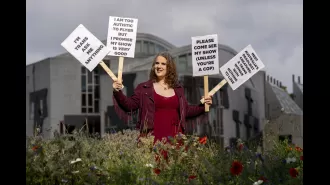Nemo from Switzerland triumphs at Eurovision Song Contest.
Swiss singer Nemo won Eurovision with their song The Code, which celebrates their journey towards embracing their nongender identity through operatic pop-rap.
May 11th 2024.

Nemo, a talented singer from Switzerland, has taken home the top prize at the 68th Eurovision Song Contest. Their winning song, The Code, is a unique blend of operatic vocals and rap that celebrates Nemo's personal journey towards embracing their nongender identity. This victory was no easy feat, as Nemo had fierce competition from Croatia's Baby Lasagna, but ultimately won the hearts of both national juries and viewers from around the world.
Not only did Nemo make history by becoming the first nonbinary winner of Eurovision, but they also made a powerful statement about equality and acceptance. During their acceptance speech, Nemo expressed their hope for the contest to continue promoting peace and dignity for all individuals.
The Eurovision Song Contest was held in Malmo, Sweden, and was met with some challenges. Large protests against Israel's participation and a backstage altercation involving Dutch competitor Joost Klein added to the already tense atmosphere. Despite these obstacles, Nemo prevailed over 24 other contestants with their captivating performance.
Each contestant had three minutes to captivate the audience with their music and stage presence. The styles ranged from rock to disco to techno and even rap, with some artists incorporating multiple genres into their acts. This diversity is what makes Eurovision such an exciting and unique event.
The contest returned to its roots in Sweden, where half a century ago, ABBA stole the show with their iconic performance of Waterloo. While the legendary band did not make an appearance in person, their digital avatars from the ABBA Voyage stage show did. A trio of former Eurovision winners also graced the stage, singing Waterloo as the votes were being tallied.
Eurovision always serves up a mix of eclectic acts, and this year was no different. Lithuania's Silvester Belt charmed the audience with his smooth vocals, while Estonia's 5Miinust x Puuluup brought a unique blend of pop and folk music featuring a traditional stringed instrument. Other standout performances included Greece's Marina Satti and Armenia's Ladaniva, who incorporated folk elements into their powerful pop songs.
But it wasn't just about the music; Eurovision also showcased some entertaining and quirky acts. Finland's Windows95man emerged from a giant egg wearing very little clothing, while Ireland's Bambie Thug summoned a demon on stage and brought along a scream coach. Spain's Nebulossa also made a bold statement by reclaiming a derogatory term used against women in their performance.
Nemo and Baby Lasagna were favored to win the contest, with their songs addressing important social issues. Nemo's ode to nongender identity and Baby Lasagna's song about young Croatians leaving their country in search of a better life resonated with both the judges and the viewers. However, Eurovision's motto of "united by music" was challenged this year, as protests and dissent overshadowed the event.
Pro-Palestinian demonstrators marched through the city, demanding a boycott of Israel and a ceasefire in the ongoing Gaza war. These protests were met with a strong police presence, and even climate activist Greta Thunberg was escorted away. Additionally, tensions were high behind the scenes, and Dutch performer Joost Klein was expelled from the competition due to a backstage altercation.
Despite these challenges, the show went on, with each performer using their platform to spread messages of love and unity. French singer Slimane even cut short his performance during the dress rehearsal to urge people to come together in love and peace. While he did not repeat this speech during the final, many other artists incorporated similar messages into their acts.
In the end, Nemo's powerful and unique performance captured the hearts of the audience and earned them the title of Eurovision champion. This victory not only marks a historic moment for the contest, but it also serves as a reminder of the power of music to bring people together. As last year's winner, Loreen, stated, the only way to heal trauma and promote positivity is through love. And that is exactly what Eurovision stands for.
Not only did Nemo make history by becoming the first nonbinary winner of Eurovision, but they also made a powerful statement about equality and acceptance. During their acceptance speech, Nemo expressed their hope for the contest to continue promoting peace and dignity for all individuals.
The Eurovision Song Contest was held in Malmo, Sweden, and was met with some challenges. Large protests against Israel's participation and a backstage altercation involving Dutch competitor Joost Klein added to the already tense atmosphere. Despite these obstacles, Nemo prevailed over 24 other contestants with their captivating performance.
Each contestant had three minutes to captivate the audience with their music and stage presence. The styles ranged from rock to disco to techno and even rap, with some artists incorporating multiple genres into their acts. This diversity is what makes Eurovision such an exciting and unique event.
The contest returned to its roots in Sweden, where half a century ago, ABBA stole the show with their iconic performance of Waterloo. While the legendary band did not make an appearance in person, their digital avatars from the ABBA Voyage stage show did. A trio of former Eurovision winners also graced the stage, singing Waterloo as the votes were being tallied.
Eurovision always serves up a mix of eclectic acts, and this year was no different. Lithuania's Silvester Belt charmed the audience with his smooth vocals, while Estonia's 5Miinust x Puuluup brought a unique blend of pop and folk music featuring a traditional stringed instrument. Other standout performances included Greece's Marina Satti and Armenia's Ladaniva, who incorporated folk elements into their powerful pop songs.
But it wasn't just about the music; Eurovision also showcased some entertaining and quirky acts. Finland's Windows95man emerged from a giant egg wearing very little clothing, while Ireland's Bambie Thug summoned a demon on stage and brought along a scream coach. Spain's Nebulossa also made a bold statement by reclaiming a derogatory term used against women in their performance.
Nemo and Baby Lasagna were favored to win the contest, with their songs addressing important social issues. Nemo's ode to nongender identity and Baby Lasagna's song about young Croatians leaving their country in search of a better life resonated with both the judges and the viewers. However, Eurovision's motto of "united by music" was challenged this year, as protests and dissent overshadowed the event.
Pro-Palestinian demonstrators marched through the city, demanding a boycott of Israel and a ceasefire in the ongoing Gaza war. These protests were met with a strong police presence, and even climate activist Greta Thunberg was escorted away. Additionally, tensions were high behind the scenes, and Dutch performer Joost Klein was expelled from the competition due to a backstage altercation.
Despite these challenges, the show went on, with each performer using their platform to spread messages of love and unity. French singer Slimane even cut short his performance during the dress rehearsal to urge people to come together in love and peace. While he did not repeat this speech during the final, many other artists incorporated similar messages into their acts.
In the end, Nemo's powerful and unique performance captured the hearts of the audience and earned them the title of Eurovision champion. This victory not only marks a historic moment for the contest, but it also serves as a reminder of the power of music to bring people together. As last year's winner, Loreen, stated, the only way to heal trauma and promote positivity is through love. And that is exactly what Eurovision stands for.
[This article has been trending online recently and has been generated with AI. Your feed is customized.]
[Generative AI is experimental.]
0
0
Submit Comment





